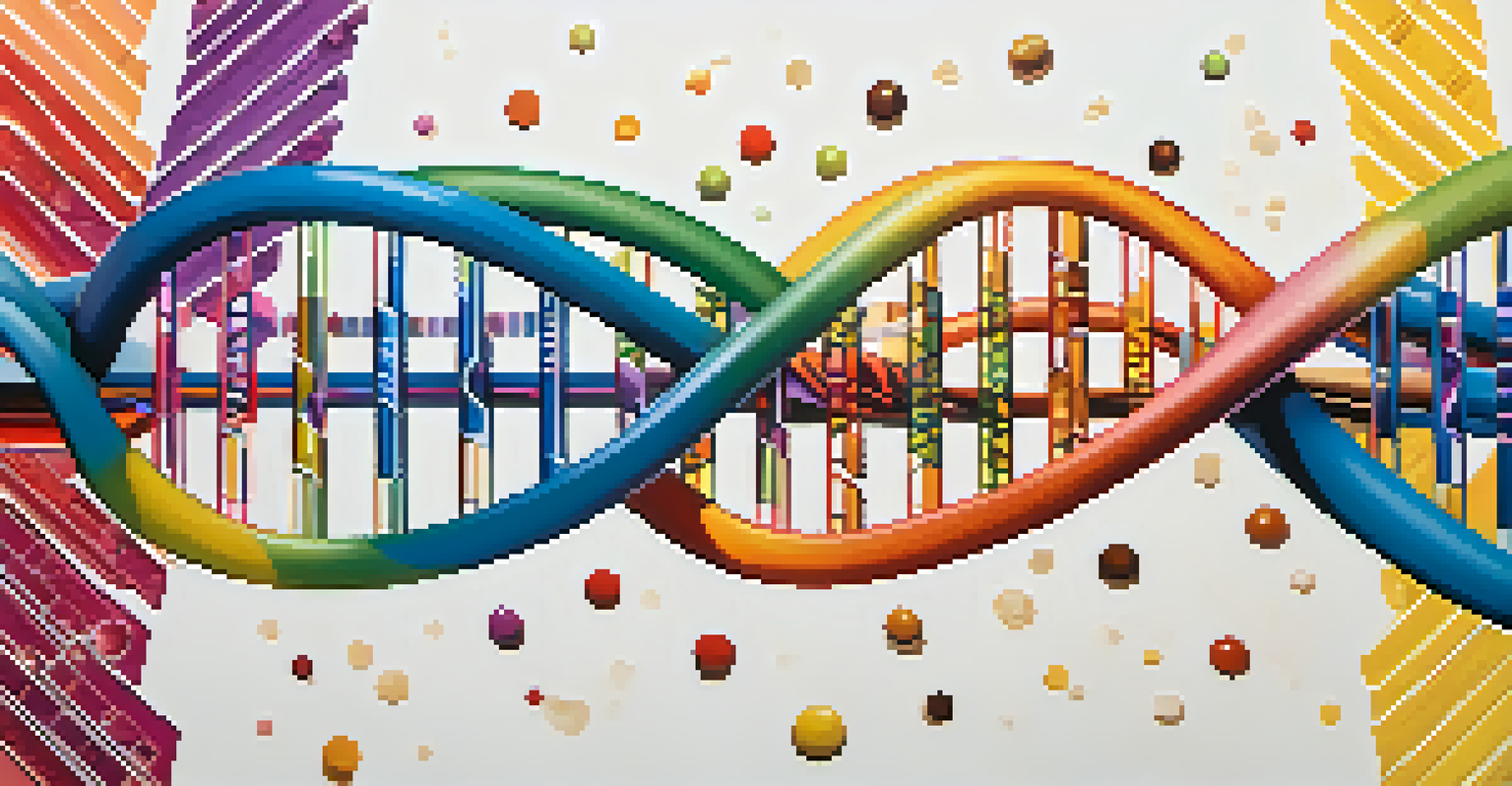The Promise of Next-Generation Sequencing in Disease Analysis

Understanding Next-Generation Sequencing (NGS)
Next-Generation Sequencing (NGS) is a revolutionary technology that allows us to decode vast amounts of DNA quickly and affordably. Unlike traditional sequencing methods, which can take weeks and cost thousands, NGS can produce millions of sequences in just a few days. This rapid processing capability opens the door to new possibilities in both research and clinical settings.
The greatest discovery of my generation is that a human being can alter his life by altering his attitude.
Imagine trying to read an entire library of books, where each book represents a different aspect of our genetic makeup. NGS acts like a super-speed librarian, organizing and cataloging this information efficiently. This not only improves our understanding of genetics but also equips researchers with the tools they need to identify disease-related mutations more effectively.
As we continue to harness the power of NGS, we're not just looking at individual genes but rather how they interact and influence each other. This holistic view is crucial for understanding complex diseases like cancer, where multiple genetic factors come into play.
Revolutionizing Disease Detection and Diagnosis
One of the most exciting applications of NGS is in the realm of disease detection and diagnosis. With the ability to analyze a patient's entire genome, healthcare providers can pinpoint genetic mutations that may predispose individuals to certain diseases. This precision in diagnosis can lead to earlier interventions and more personalized treatment plans.

Consider the case of hereditary cancers, where individuals may be at increased risk due to inherited genetic mutations. Through NGS, doctors can identify these mutations and offer patients tailored screenings or preventive measures. It's like having a roadmap that helps guide patients through their healthcare journey.
NGS Transforms Disease Diagnosis
Next-Generation Sequencing enables precise identification of genetic mutations, allowing for earlier interventions and personalized treatment plans.
Moreover, NGS can also assist in diagnosing rare genetic disorders that often go unnoticed with conventional testing methods. By providing a comprehensive view of a patient's DNA, healthcare professionals can uncover hidden genetic anomalies that may be the root cause of unexplained symptoms.
Advancing Personalized Medicine
Personalized medicine is all about tailoring treatments to the individual characteristics of each patient. NGS fits perfectly into this model, as it allows for the identification of genetic variations that can influence how patients respond to specific medications. This means that treatments can be optimized, enhancing their effectiveness and minimizing side effects.
Science knows no country, because knowledge belongs to humanity, and is the torch which illuminates the world.
Think of it like adjusting a recipe based on the ingredients you have at home. NGS gives doctors the insights needed to modify treatment plans to suit each patient’s unique genetic makeup. This shift towards personalized care is already making waves in fields like oncology and pharmacogenomics.
As more patients undergo NGS testing, we’re building a database of genetic information that can inform future treatment protocols. This collective knowledge not only benefits individual patients but also helps researchers identify broader trends and improve therapeutic strategies.
Understanding Disease Mechanisms Through NGS
Next-Generation Sequencing can also play a vital role in unraveling the complex mechanisms underlying diseases. By analyzing genetic data from populations affected by specific conditions, researchers can identify common mutations and pathways involved in disease progression. This understanding is crucial for developing targeted therapies.
Imagine piecing together a puzzle where each piece represents a different aspect of a disease. NGS provides the pieces needed to see the bigger picture, allowing scientists to identify how genetic variations contribute to the development and severity of diseases. This insight can pave the way for innovative treatment approaches.
Personalized Medicine Revolution
NGS facilitates tailored treatments by revealing genetic variations that influence patient responses to medications.
Furthermore, NGS can aid in tracking how diseases evolve over time, especially in rapidly changing fields like infectious diseases. By sequencing pathogens, researchers can monitor mutations that might affect transmission or vaccine efficacy, helping to stay one step ahead in public health.
NGS and Its Role in Drug Discovery
The application of NGS extends beyond diagnosis and treatment; it also plays a significant role in drug discovery. By understanding the genetic underpinnings of diseases, researchers can identify new drug targets and develop therapies that more effectively address specific conditions. This could lead to breakthroughs in treating diseases that currently have limited options.
Imagine a treasure hunt where each clue leads you closer to discovering a hidden gem. NGS acts as a powerful tool in this hunt, guiding researchers to potential drug candidates by revealing the genetic landscape of diseases. This targeted approach can significantly reduce the time and cost associated with bringing new drugs to market.
In addition, NGS can be used to monitor how new drugs affect patients at the genetic level. By analyzing changes in gene expression or mutation status in response to treatment, researchers can gather valuable feedback that informs further development.
Challenges and Limitations of NGS
While the promise of NGS is immense, it's essential to acknowledge the challenges and limitations that come with it. One significant hurdle is the interpretation of the vast amounts of data generated. Unlike reading a single book, analyzing millions of sequences requires sophisticated bioinformatics tools and expertise.
Additionally, not all genetic variants found through NGS are clinically relevant. Some might be benign alterations that don’t impact health, leading to potential confusion for patients and healthcare providers alike. It’s crucial to differentiate between harmful mutations and those that are simply variations of no consequence.
Future of NGS Looks Promising
Advancements in NGS technology will make genomic information more accessible, enhancing preventive medicine and health outcomes.
Lastly, there are ethical considerations surrounding genetic data. As we collect and analyze more genetic information, ensuring patient privacy and data security becomes paramount. The balance between advancing science and protecting individual rights is a challenge that the field must navigate carefully.
The Future of NGS in Healthcare
Looking ahead, the future of Next-Generation Sequencing in healthcare is bright. As technology continues to advance, we can expect even more rapid sequencing times and lower costs, making NGS accessible to a broader population. This democratization of genomic information could transform the landscape of preventive medicine.
Envision a world where routine health screenings include NGS, allowing for early detection of genetic risks before they manifest into diseases. This proactive approach could significantly improve health outcomes and reduce healthcare costs associated with treating advanced illnesses.

Moreover, as the integration of artificial intelligence and machine learning in NGS analysis improves, we will likely see breakthroughs in identifying complex patterns in genetic data. The synergy between technology and biology will undoubtedly unlock new avenues for understanding and treating diseases.